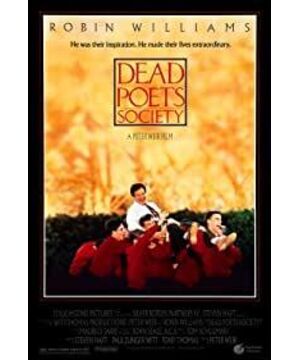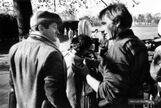When I first became a teacher, I was also full of passion. I used some unconventional ways to let students know how to fully express themselves, learn to think independently, and know how to grasp the moment (sieze the day, translated as "just in time" in the movie, combined with Chinese In the context of this, I am afraid it is somewhat inappropriate). However, the fact is that you have to admit that the differences between people are bigger than you think.
On the surface, human development is infinitely rich and highly malleable (Freud and Marx both think so). But actually you have to admit that this idea is an ideal. The limitations of each person for various reasons have various obstacles to development, and some limitations cannot be completely changed or completely eliminated (such as certain congenital disabilities). You can think about it, if you only consider three reasons for a person’s success: family origin (including the material and cultural environment of the family you came from), social connections (the vast majority of the relationships are actually caused by your family origin) and schooling. Among the three, the proportion of school education to the success function is how much, a statistic tells me that it is 20%. In fact, every road related to development is "crossing the river by feeling the stones". Shi Tiesheng has a saying, to the effect: if you stand in the present and look forward, there are countless possibilities in the future, but when you look back, you will find that there is only one way to go. I agree.
However, the movie goes beyond that, and has a much more in-depth discussion.
When Heidegger talks about "what you are" depends entirely on how you are going to be", he never forgets to emphasize "go ahead to the future" - "We are under the sky and above the earth. , keep dying." The former is the spirit of "Nus" that is surging with passion, and the latter is the spirit of "Logos" that follows objectivity and maintains rationality. "Nus" promotes rational exploration and development, while "logos" restrains the excessive and overflowing passions, and the two should be harmoniously unified. If the old and dull Wilton Preparatory College ignored the former, then Mr. Keating just ignored the latter.
Mr. Keating claimed that he also graduated from this "hell school", and he knew that the mentality of the students was just like his own. When the freshmen reported, the conversation between the freshmen in the dormitory also showed this. It is difficult to say whether Mr. Keating has incorporated his unfulfilled ideals and his dissatisfaction with this school into his teaching ideas and behaviors.
For students of this age, if you just tell them to break the rules (stand on the desk and look at the world), defy authority (tear the preface of the textbook), I say myself (walking teaching in the atrium), sieze the day (The "whispering" of the seniors and seniors in those photos), then while passion is aroused, irrationality will also be aroused (there are many movies about this kind of discussion, such as "The Wave"), this kind of coercion Irrational passions are not ideals, morals and justice, but merely physical pleasures (which are discussed in detail in Gustave Le Pen in The Rabble and Revolutionary Psychology). Facing this powerful passion, Mao Zedong couldn't handle it, Rainer Wenger (the teacher in The Wave) couldn't handle it, and neither could Mr. Keating. Moreover, the method of stimulating irrational passion is always extreme. Let’s take “tear the book” as an example. I remember when I was in college, the teacher who taught literary theory told me that what you studied was not “literature”, but "Literature", the study of literature - also, in the preface that Mr. Keating asked students to tear up, the author was talking about the evaluation method of poetry rather than the principle of creation. This method is to say that the key to evaluating a poem is to Grasp two points, one is the meaning expressed by the poem, and the other is the technique of expressing the meaning. I think, as a preparatory poetry textbook, this statement is accurate and appropriate. However, Mr. Keating guided the students to take the author down as an authority. During this process, there was a very interesting scene. Mr. Keating did not express any objection to the teaching material, and even wrote on the blackboard against Byron according to the method stated in the teaching material. When commenting on Shakespeare, a student carefully recorded the content on the blackboard in his notebook, and even drew the coordinates with a ruler. However, when Mr. Keating turned around and commented that this statement was "all nonsense", the student immediately recorded what he had just recorded. notes are crossed out. This fully shows that students have no rational judgment. Mr. Keating is nothing more than replacing the downed authority with the identity of authority, becoming "Captain, my Captain". Students get not the ability to think rationally and independently as he expects, but another form of authoritative dependence and worship.
When Neil was helpless and weeping in front of him, when Neil followed his father and drifted away from his gaze, he—Mr. Keating had already recognized and had a premonition of this tragedy. But there was nothing he could do. Therefore, the most important reason why I disagree with this educational philosophy is that you teach and teach, but you do not teach students how to compromise and love life. Faced with his father's questioning, Neil can only answer "nothing", and the only solution is suicide. As a teacher, Mr. Keating didn't realize from the beginning that not everyone is suitable to be a poet, and he didn't think about the irrational elements of the passion you inspired. Can you properly divert it? If it is determined to the end and stubbornness can achieve the beauty that has been depicted and promised, then we must admit that countless people have paid the price of their lives for it but have not received the promised promise. When we face life, it is normal for Xiao to survive in the cracks, and the vigorous passion and unrestrained wildness in life are only one end of the cracks, not the whole, otherwise it will not matter. What Hu Shizhi said in his later years: "Patience is more important than freedom" is by no means summed up by a rhetoric of "cynicism" (this is how Mr. Keating views his colleagues in the film). However, in the face of this crack, how can we no longer be at a loss and be at a loss?
At the end of the film, you will clearly see that in the face of strong pressure from the school, everyone has to sign the "confession letter", and they all have to become the complicit in launching the "scapegoat" and use the accomplice as a "stained witness". The way to protect yourself, you will find that the logic of "one thousand miles" at this time is the same as when the poetry society movement was surging, the people in it were more and more arrogant, and their behavior became more and more irresponsible. are completely interconnected internally.
At the last moment when the children stood at the desk to protest, the director was probably also confused, and he did not provide an answer to the question. But I could clearly hear that when Mr. Keating said Thank you, Boys, he was not just thanking them for standing on the desk and shouting Captain, my Captain again.
View more about Dead Poets Society reviews






